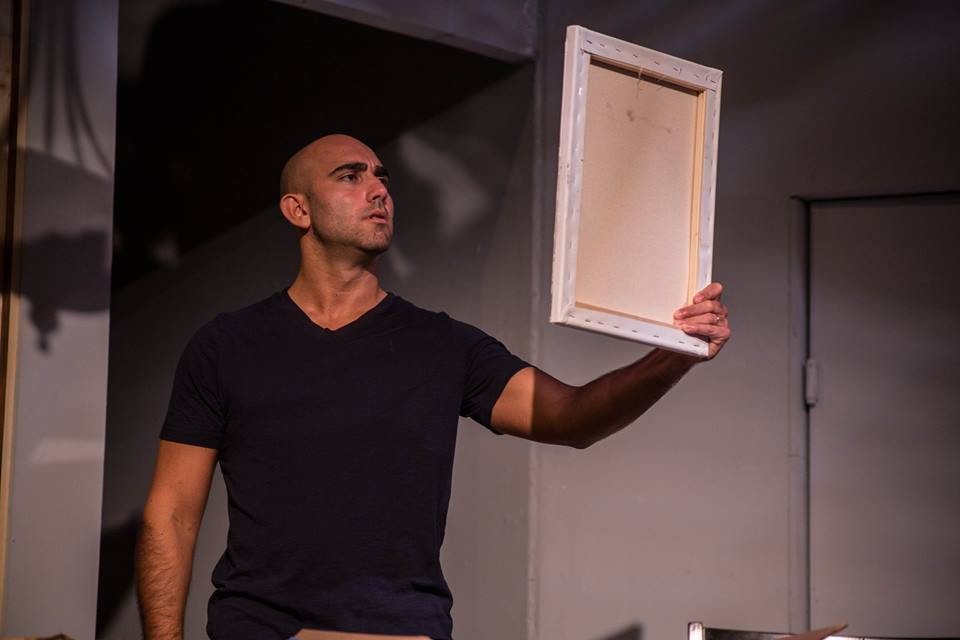
To be, or not to be… framed?
So a muslim, a white liberal, a black, and a jew walk into a theater… And no, that’s not the beginning of a joke that got someone shamed off Twitter. There’s no regrettable punchline here unless, of course, you mean the punch in the gut delivered by Ayad Akhtar’s Pulitzer Prize winning one-act play Disgraced, which is available for local consumption at Circuit Playhouse through September4.
And who doesn’t love a good punch in the gut now and then?
Disgraced is a play you need to see if you’re a fan of fine acting and/or argumentative, politically-charged drama. Irene Crist, who directed Circuit’s vividly-realized production, has done her part to give the acclaimed show the life and wit it deserves. Still, I’ve got mixed feelings, no matter how much tough truth it spills in 90 overly-familiar, coincidence-packed minutes.
The show is often described as being about cross-cultural identity and the obstacles facing Muslim-Americans post 9-11. But since the proscenium’s frame turns the mundane into myth, so it also functions — less fortunately — as a domesticated metaphor for globalism, radicalization, and terrorism, with the latter part expressed as a shocking moment of rage-fueled violence.
The story: Amir (Gregory Szatkkowski), is a hotshot Pakistani-American lawyer with a shot at becoming a partner at the prestigious Jewish law firm where he works harder than anybody. He’s derailed when his artist wife Emily (Natalie Jones) talks him into helping an Imam who’s been accused of raising money for extremists. It’s not paranoia when people really are conspiring against you and after his name’s associated with a suspected Islamic radical, the knives come out for Amir. He becomes increasingly (and understandably) agitated by snubs, and other signs that he’s falling from favor professionally.
Emily’s an artist gunning for a show at the Whitney. She’s also -in an unguarded moment- bedded Isaac, the Jewish man (Gabe Buetel-Gunn) who can make that show happen and who just happens to be married to the African American attorney (Jessica “Jai” Johnson) who, unbeknownst to Amir, has been given the partnership he was expecting. The hard-drinking dinner party that brings all these characters together to nibble on fennel and anchovy salad, plays out like a deconstruction of Who’s Afraid of Virginia Woolf as imagined by God of Carnage playwright Yasmina Reza using snippets of a real life newspaper comment section argument for dialogue. Noteworthy too, in a trivia-conscious play about American identities, everybody eats pork.
Disgraced Sets A Course for Conflict
There are things you can be sure of. Like when somebody produces a gun on stage you can bet it will fire before the show’s over. While there are no firearms in this play, there are linguistic equivalents, and they strongly telegraph certain outcomes. Similarly, it’s common enough for certain kinds of plays to climax with seemingly openminded characters revealing their prejudices by shouting racially-charged epithets in a moment of rage. Those familiar with the trope may find themselves anticipating this ugly inevitability. Akhtar might be appropriating these things ironically and aiming for ritual, but the effect is a little closer to deja vous.
Amir describes himself as an apostate and the Quran as hate mail to humanity stating, “There’s a result to believing that a book written about life in a specific society fifteen hundred years ago is the word of God: You start wanting to recreate that society… That’s why you have people like the Taliban. They’re trying to re-create the world in the image of the one that’s in the Quran.” Events that follow result in a similar simulacrum, and Amir gives in to his scriptural destiny.
There’s a frustrating air of fatalism to Disgraced, as atavistic pride bends toward violent predisposition. But never mind the complaints. Terrific casting and scenic design evocative of Manhattan privilege help make up for predictability, and naked provocation.
Disgraced picked up its Pulitzer in 2012 — a presidential election year, but not like this one. The newly-minted Tea Party, emboldened by it’s reactionary, anti-Obama midterm success, was just starting to stir a white nationalistic pot of extreme conservatism that bubbled over into Donald J. Trump’s 2016 campaign for the White House. Today Disgraced‘s cast of characters represent a microcosm of that candidate’s clearly defined enemies. There are brown people, black people, immigrants, “East Coast Intellectuals,” and liberals “with blood coming out of their whatever,” all gathered together in one place to rehearse — as it is written — their parts for the end of the world. And so a play that aims for hard questions and complexity begins to feel a bit like propaganda. Nevertheless, its clearer and cloudier moments will both leave audiences with questions of their own, and that may very well be the point.